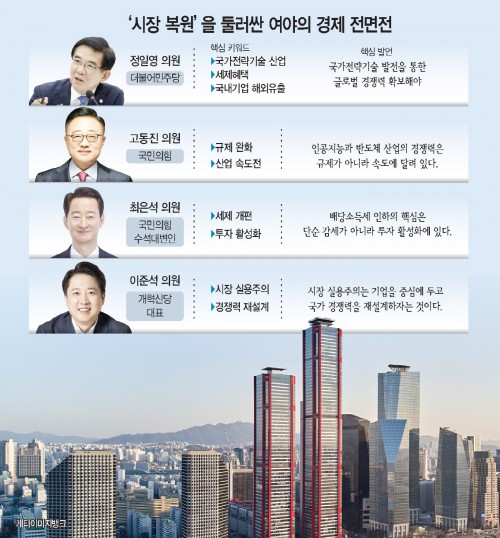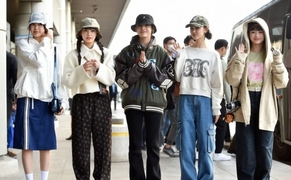 |
South Korea’s political parties are rushing to promote market-friendly legislation aimed at easing regulations, restoring investor confidence, and revitalizing domestic industry. Both the opposition and ruling blocs are framing pro-business policy as essential to sustaining growth amid global trade tensions and sluggish investment.
Opposition champions “market restoration” through deregulation and tax reform
The opposition People Power Party (PPP) has made “market restoration” its rallying cry, criticizing what it calls the ruling bloc’s anti-business legislative push, including the so-called “Yellow Envelope Act” and amendments to the Commercial Act. Opposition leaders argue that “when businesses thrive, livelihoods improve,” calling for swift deregulation and corporate tax relief.
PPP lawmaker Ko Dong-jin, a former business executive, is leading the charge. His proposed Special Act on AI Industry Development, introduced in September, designates artificial intelligence and semiconductors as national strategic industries, offering tax incentives and establishing regulatory sandboxes. “This bill reflects a paradigm shift in industrial policy,” Ko told The Korea Economic Daily. “We must move away from preemptive regulation toward a model that allows experimentation first and institutional correction later.”
Calls for tax restructuring are also growing. Choi Eun-seok, the PPP’s chief spokesperson and former CEO of CJ CheilJedang, said in an interview that the current tax system “distorts corporate dividend policies and household investment behavior.” He added, “Lowering dividend income taxes isn’t about helping the rich—it’s about boosting investment. Since citizens participate as shareholders through pension funds, tax relief ultimately benefits the public.”
Lee Jun-seok, leader of the New Reform Party, is promoting “market pragmatism,” a policy approach that limits government intervention and supports open competition. “Market pragmatism means redesigning national competitiveness around businesses,” Lee said. “If the current government’s market liberalism remains rhetorical, ours must translate into real investment in talent and technology.”
Ruling party highlights industrial competitiveness and trade diversification
Lawmakers in the ruling Democratic Party of Korea (DPK) are also moving to strengthen domestic competitiveness. Rep. Jung Il-young recently proposed amending the Special Tax Treatment Control Act to grant tax benefits to firms producing and selling domestically within designated national strategic technology sectors.
“Amid the U.S.–China trade conflict, Korean firms are losing ground,” Jung said. “If this bill passes, it will send a clear signal that producing in Korea—especially in Incheon—is profitable.”
Jung warned that President Donald Trump’s renewed tariff policy is straining the U.S.–Korea alliance while China trade remains uncertain. “To remain indispensable to both sides, Korea must enhance industrial competitiveness and diversify its trade portfolio,” he said, urging greater engagement with the EU, ASEAN, and India.
Citing a survey of Korea’s 500 largest companies, Jung noted that labor market rigidity, taxes, and investment restrictions remain top barriers to growth. “More than one-third of firms believe the regulatory environment has worsened compared with last year,” he said. “We need bold tax incentives and a shift to a negative regulatory framework that encourages innovation rather than discourages it.”
Most Read
-
1
-
2
-
3
-
4
-
5
-
6
-
7





















